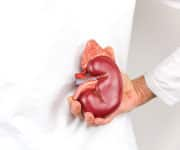Life Extension Magazine®

“My mother has chronic kidney disease, and I have been reading about a possible treatment using sodium bicarbonate. Her doctor has concerns about this approach but doesn’t give me any details. Can you provide more information, pros and cons, about this treatment?”
Thank you for your question and sorry to hear about your mom. I am assuming that you’re asking because she’s showing signs of progressive kidney dysfunction, such as worsening metabolic acidosis, abnormal urine tests, and symptoms such as muscle weakness.
Unfortunately, this is how chronic kidney disease (CKD) progresses. And I totally understand wanting to try anything to help your mom and slow down the progression of kidney dysfunction.
However, your doctor has good reason to be concerned. Although short-term studies show a benefit from oral bicarbonate therapy, long-term safety data are lacking. But let’s do our own thorough review of the scientific literature and see what conclusions we can draw.
What you need to know
The hallmark of chronic kidney disease is metabolic acidosis, a condition in which the body pH rises above 7.4. This results in deleterious conditions such as low bone mineralization, muscle breakdown and insulin resistance. An urgent need exists to determine the best treatment for chronic kidney disease. In this article, Michael Smith, MD, will objectively evaluate the research on sodium bicarbonate to determine its effectiveness and safety. He will also explain and compare sodium bicarbonate to some other potential treatments and explain the tests used to evaluate kidney function. Learn more about sodium bicarbonate and the kidneys in this article.
Metabolic Acidosis is the Hallmark of Chronic Kidney Disease

First, some background. The kidneys play an important role in maintaining metabolic homeostasis. Although there are several components to metabolism, the kidneys specifically balance acids and bases, helping your body maintain a slightly alkaline (basic) pH of around 7.4.
The kidneys accomplish this by excreting the daily acid load, derived mostly from the metabolism of amino acids, as phosphoric acid and ammonium.1 The more acids the body produces, the more phosphoric acid and ammonium the kidneys excrete — thus helping to maintain balance.
However, all of this reverses with kidney dysfunction. As less of the daily acid load is excreted, the blood becomes more acidic. Eventually, an imbalanced state develops called metabolic acidosis, which is commonly associated with chronic kidney disease.2
This process is a vicious cycle. Chronic kidney disease results in metabolic acidosis, which in turn causes more kidney damage. Additional problems include low bone mineralization, muscle breakdown, insulin resistance, high triglycerides, systemic inflammation, low blood pressure, and malaise.2-5
Restoring metabolic balance by reversing metabolic acidosis is one of the goals in treating chronic kidney disease, and this is where oral sodium bicarbonate comes into play.
Benefits of Oral Bicarbonate Therapy
Sodium bicarbonate naturally buffers retained acids in the body. Some clinicians believe that by increasing bicarbonate levels and enhancing the buffering effect, metabolic acidosis will decrease, along with many of its associated problems.
The first study I came across in support of this theory evaluated the effects of oral bicarbonate and muscle strength in 20 people with chronic kidney disease and mild acidosis. They were treated during successive two-week periods with a placebo followed by increasing oral sodium bicarbonate doses.6 In this short, small study, the results showed a dose-dependent increase in serum bicarbonate (which means better buffering of acids) and improvement in lower extremity muscle strength.6
Interestingly, higher bicarbonate doses were not associated with increased blood pressure or greater edema. This is an important point, as doctors fear oral bicarbonate may raise blood pressure.6
A second study randomly assigned 134 people with chronic kidney disease to either oral sodium bicarbonate or standard-of-care for two years. The researchers followed the subjects’ creatinine clearance (a measure of kidney function that declines with chronic kidney disease) and nutritional parameters, such as dietary protein intake.7
The researchers concluded that oral bicarbonate supplementation slows the rate of decline of creatinine clearance and helps to improve nutritional parameters. Additionally, they were able to show that subjects taking bicarbonate were significantly less likely to experience a rapid decline in kidney function.7
The research literature seems good so far. We’ve reviewed two studies showing improved acid buffering, less muscle weakness, slower rates of decline in creatinine clearance, and improvements in nutritional status with oral bicarbonate supplementation.
The next study I found was a longer, five-year prospective study that recruited 120 people with high blood pressure that resulted in kidney dysfunction.8 They were randomized into three groups: placebo, sodium chloride, and sodium bicarbonate.
The researchers measured the rate of filtration through a specific part of the kidney called the glomerulus. Doctors refer to this measurement as the glomerular filtration rate (GFR), which can progressively decline despite the adequate control of hypertension.8
After five years, the rate of GFR decline was slower and total GFR was higher in patients given sodium bicarbonate than in those given placebo. Additionally, urinary indices of kidney damage also improved in the bicarbonate group.8
This is good news — a larger and longer study of oral bicarbonate therapy showed that it can preserve glomerular filtration rate, a measurement that usually declines despite treating high blood pressure.
The authors concluded:
“…our study shows that in hypertensive nephropathy, daily sodium bicarbonate is an effective kidney protective adjunct to blood pressure control…”9
Is Eating Veggies Just as Good?

Let’s not jump on the bicarbonate bandwagon just yet.
It turns out that eating fruits and vegetables is most likely a safer option and is beneficial for people with chronic kidney disease as well. This next study may help put some of this into perspective.
The researchers randomly assigned people with stage 4 chronic kidney disease (there are five stages in all) to either oral bicarbonate or a diet rich in fruits and vegetables designed to reduce dietary acid by half. Then they followed them for one year.9 Using a standard measurement of acidity, the researchers found that both treatment arms reduced metabolic acidosis, although bicarbonate therapy produced significantly better results.9
So eating fruits and vegetables is not as good. However, given some of the concerns of bicarbonate therapy, it could be a better option for some people with chronic kidney disease.
Scant Long-Term Data Merit Concern
Please be aware that, although the results of these studies are favorable, there remains a great deal of uncertainty as to the long-term viability of this approach in chronic kidney disease, particularly in older people. Strong, objective evidence to support the effectiveness and safety of sodium bicarbonate in older patients with chronic kidney disease is not available, though some small studies have suggested a benefit.
It really comes down to risk, which can include worsening hypertension due to sodium load, worsening edema, arterial calcification, and maybe even heart failure. For example, there’s a possibility that vascular calcification can occur since bicarbonate makes phosphate less soluble. This may promote precipitation of calcium phosphate within arterial blood vessel walls.
Additionally, a 2013 study suggests a 14% increased risk of heart failure with each 1-mEq/L increase in serum bicarbonate level over 24 mEq/L. These are observational data, so the causal relationship is unknown.10
Lastly, optimal dosing for oral sodium bicarbonate has yet to be established. Identifying the effective dose, where the risk-to-benefit ratio is low, is a critical piece of information that’s currently missing. Keep in mind that too much bicarbonate can create an imbalance on the opposite end of the spectrum, called metabolic alkalosis.
The Final Word

Compelling evidence from controlled, long-term studies in older patients is desperately needed to understand the impact of bicarbonate supplementation in chronic kidney disease before recommending this treatment to older patients who suffer from the illness.
Many factors play a role in determining a specific dose of sodium bicarbonate. If you wish to discuss using bicarbonate with your physician, dosages used in studies range from 1.5 g/day to 5 g/day.7,11,12
If you embark on a program with oral bicarbonate for chronic kidney disease, close monitoring of your dose and serum bicarbonate level is strongly suggested, preferably under the care of a nephrologist.
Dr. Michael Smith, a graduate of the University of Texas Southwestern Medical School, is senior health scientist and online personality for Life Extension®. Often described as “the country doctor with a city education,” Dr. Smith is an author, blogger, and lecturer who has created and conducted numerous health-related webinars, as well as scripted and hosted a variety of nformative online videos.
If you have any questions on the scientific content of this article, please call a Life Extension® Wellness Specialist at 1-866-864-3027.
References
- Hamm LL, Nakhoul N, Hering-Smith KS. Acid-Base Homeostasis. Clin J Am Soc Nephrol. 2015;10(12):2232-42.
- Kraut JA, Kurtz I. Metabolic acidosis of CKD: diagnosis, clinical characteristics, and treatment. Am J Kidney Dis. 2005;45(6):978-93.
- Lemann J, Jr., Litzow JR, Lennon EJ. The effects of chronic acid loads in normal man: further evidence for the participation of bone mineral in the defense against chronic metabolic acidosis. J Clin Invest. 1966;45(10):1608-14.
- Kopple JD, Kalantar-Zadeh K, Mehrotra R. Risks of chronic metabolic acidosis in patients with chronic kidney disease. Kidney Int Suppl. 2005(95):S21-7.
- Kalantar-Zadeh K, Mehrotra R, Fouque D, et al. Metabolic acidosis and malnutrition-inflammation complex syndrome in chronic renal failure. Semin Dial. 2004;17(6):455-65.
- Abramowitz MK, Melamed ML, Bauer C, et al. Effects of oral sodium bicarbonate in patients with CKD. Clin J Am Soc Nephrol. 2013;8(5):714-20.
- de Brito-Ashurst I, Varagunam M, Raftery MJ, et al. Bicarbonate supplementation slows progression of CKD and improves nutritional status. J Am Soc Nephrol. 2009;20(9):2075-84.
- Mahajan A, Simoni J, Sheather SJ, et al. Daily oral sodium bicarbonate preserves glomerular filtration rate by slowing its decline in early hypertensive nephropathy. Kidney Int. 2010;78(3):303-9.
- Goraya N, Simoni J, Jo CH, et al. A comparison of treating metabolic acidosis in CKD stage 4 hypertensive kidney disease with fruits and vegetables or sodium bicarbonate. Clin J Am Soc Nephrol. 2013;8(3):371-81.
- Dobre M, Yang W, Chen J, et al. Association of serum bicarbonate with risk of renal and cardiovascular outcomes in CKD: a report from the Chronic Renal Insufficiency Cohort (CRIC) study. Am J Kidney Dis. 2013;62(4):670-8.
- Gaggl M, Cejka D, Plischke M, et al. Effect of oral sodium bicarbonate supplementation on progression of chronic kidney disease in patients with chronic metabolic acidosis: study protocol for a randomized controlled trial (SoBic-Study). Trials. 2013;14:196.
- Witham MD, Band MM, Littleford RC, et al. Does oral sodium bicarbonate therapy improve function and quality of life in older patients with chronic kidney disease and low-grade acidosis (the BiCARB trial)? Study protocol for a randomized controlled trial. Trials. 2015;16:326.

